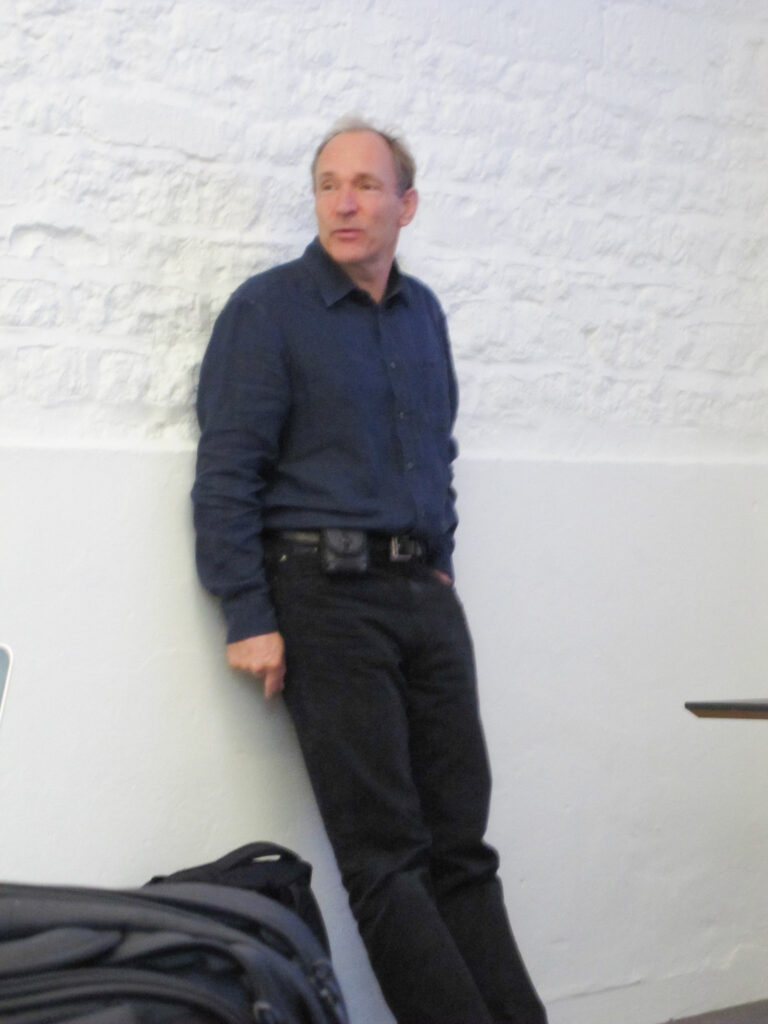Gutenberg 2.0

Tim Berners-Lee, the inventor of the World Wide Web — and the spiritual heir of Johannes Gutenberg as the second individual in history to revolutionise humanity’s information ecosystem. He’s always been a hero of mine. The photo was taken in September 2010 at a Royal Symposium that I attended at which we had a conversation about the way people misunderstand the Internet — a conversation that led me to write my second book, From Gutenberg to Zuckerberg. Wonderful, wonderful man.
Quote of the Day
”Her full nature, like that river of which Cyrus broke the strength, spent itself in channels which had no great name on the earth. But the effect of her being on those around her was incalculably diffusive: for the growing good of the world is partly dependent on unhistoric acts; and that things are not so ill with you and me as they might have been, is half owing to the number who lived faithfully a hidden life, and rest in unvisited tombs.”
- George Eliot, writing of Dorothea at the end of Middlemarch
Musical alternative to the morning’s radio news
Ye Vagabonds | I’m a Rover
We’re going to hear them live tonight. Can’t wait.
Long Read of the Day
Railways Redux
I keep looking for ways of putting the current AI investment bubble into historical context, and Dave Birch (Whom God Preserve) has come up with the goods, or at least some of them — for which many thanks.
Victorian Britain’s railway boom was truly colossal. The first railway service in the world started running between Liverpool and Manchester in 1830 and less than two decades later (by 1849), the London & North Western railway had become the Apple of its day, the biggest company in the world.
(See Christian Wolmar’s fabulous Fire and Steam for a beautifully written history of the railways.)
This boom led to a colossal crash in 1866. The crash was caused (here’s a surprise) by the banking sector, but in that case it was because they had been lending money to railway companies who couldn’t pay it back rather than American homeowners who couldn’t pay it back.
Then, as in our very own crash of 2007, the government had to respond. It did so by suspending the Bank Act of 1844 to allow banks to pay out in paper money rather than gold, which kept them going, but they were not too big to fail and the famous Overend & Gurney bank went under. When it suspended payments after a run on 10th May 1866 (as frequently noted, the last run on a British bank until the Northern Rock debacle), it not only ruined its own shareholders but caused the collapse of about 200 other companies (including other banks).
(The directors of Overend and Gurney were, incidentally, charged with fraud but got off as the judge said that they were merely idiots, not criminals.)
Read on to find out what Benjamin Disraeli said to the directors of the railway companies when their Directors went to see him in 1867 to ask for the nationalisation of the railway companies to stop them from collapsing.
(He’s right about Christian Wolmar’s book, btw.)
My commonplace booklet
I’ve always loved this time of year. Maybe it’s because I’ve spent most of my working life in universities. It’s the beginning of the Michaelmas Term in Cambridge and it was wonderful walking around the place last weekend to see a fresh crop of fortunate (and bright) kids trying to get their bearings, and getting used to the idea that maybe they’re really adults at last.
I vividly remember the exhilaration I felt walking into University College Cork to register for an engineering degree course in 1964, or arriving in Emmanuel College in Cambridge in 1968 — the kind of feeling once captured by P.G. Wodehouse as “having died and gone to heaven without the trouble and expense”.
Which then led me to think of the way Covid robbed two generations of students of that magical first year experience. It was truly horrible to see the impact of that deprivation on those cohorts of young people.
Feedback
Brad DeLong had a nice take on Neal Stephenson’s essay, “Show it, don’t tell it” which was the Long Read on Wednesday:
“Neal Stephenson tells us: Dickens could do in 15 words what “show it, don’t tell it” would need 15 sentences of paragraphs to accomplish. It works for a reader willing to do the work of coöperating with the author in the construction of the fictional world portrayed—which requires spinning-up and running a Sub-Turing instantiation of the author on one’s own wetware to converse with. That is perhaps the most important piece of learning to read, and of becoming a front-end node to the real ASI that is humanity’s collective mind.”
NOTE ASI = ’Artificial Superintelligence’
This Blog is also available as an email three days a week. If you think that might suit you better, why not subscribe? One email on Mondays, Wednesdays and Fridays delivered to your inbox at 5am UK time. It’s free, and you can always unsubscribe if you conclude your inbox is full enough already!
